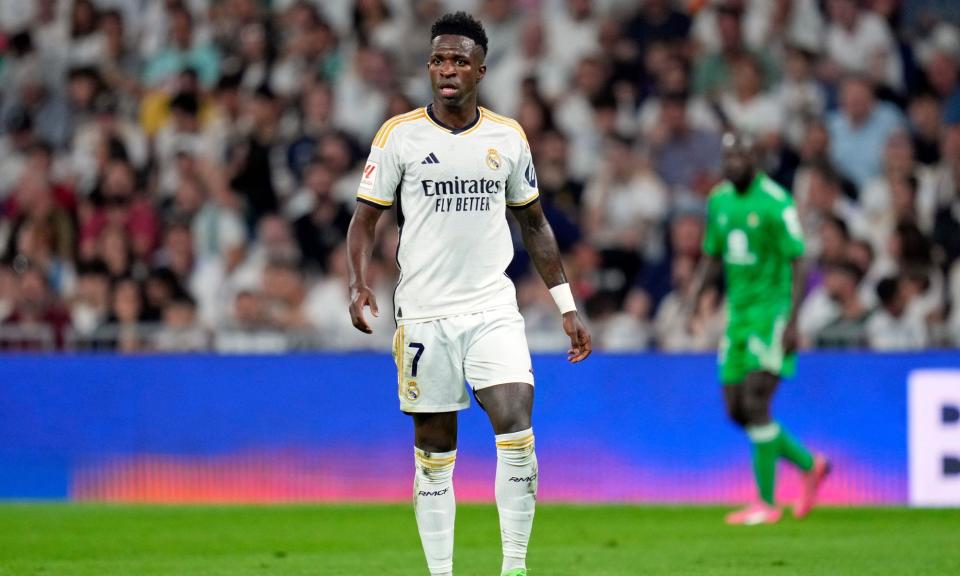Valencia fans who racially abused Vinícius Júnior given prison sentences

Three Valencia fans have been sentenced to eight months in prison for hate crimes against Real Madrid’s Vinícius Júnior, in what La Liga described as the first conviction related to racist abuse at a football match in Spain.
The ruling goes back to a match in May last year during which several Valencia fans hurled racist slurs at the Brazilian footballer. The match came to a halt for several minutes as Vinícius pointed to a Valencia fan in the stands, telling his teammates that the man had called him a monkey and made the gestures of an ape.
Images of Vinícius on the Valencia pitch, tears welling in his eyes, swiftly made headlines around the world, recasting a spotlight on Spanish football’s longstanding failure to tackle racism. While Valencia moved to ban the fans from the stadium, Vinícius vowed to fight on. “I will go up against the racists until the very end,” he said.
Related: Campaigners in Spain call for more to be done about racism in football
On Monday, more than a year later, La Liga said that three individuals had been convicted over the racist abuse. They had been sentenced to eight months in prison, handed a two-year stadium ban and ordered to pay the cost of the legal proceedings. They had also been made to read a letter of apology to Vinícius, La Liga and Real Madrid, the league added.
An agreement struck during the investigation cut their sentences by a third; if the individuals had not cooperated, they would have faced imprisonment lasting 12 months and a three-year stadium ban, according to La Liga.
The defendants may not have to actually serve any time in prison; in Spain, a prison sentence of less than two years for nonviolent crimes does not usually lead to any time behind bars unless the offender has a previous criminal record.
On Monday, La Liga described the ruling as “great news”, and said it “sends a clear message to those people who go to a football stadium to insult that La Liga will identify them, report them and there will be criminal consequences”.
The conviction came after La Liga, Real Madrid and Vinícius brought the case to the court, it said in a statement. “This is the first conviction of its kind to be handed down in Spain.”
La Liga said it had repeatedly requested that Spanish law be amended to give the league power to sanction clubs, fans or players for hateful conduct, rather than rely solely on reporting such conduct to authorities. In the last two seasons, La Liga has reported 16 incidents of racist abuse against Vinícius to Spanish prosecutors.
The president of La Liga, Javier Tebas, who came under fire for initially failing to criticise the racism in Valencia, on Monday reiterated the demand for sanctioning powers in order to “speed up the fight against racism”.
He said: “I understand that there may be some frustration at the length of time it takes for these sentences to be handed down, but this shows that Spain is a country that guarantees judicial integrity.”
Esteban Ibarra, who heads Spain’s Movement Against Intolerance, Racism and Xenophobia, described the conviction as “great news” for the country. “The message is loud and clear,” he said. “This is a crime and perpetrators will have to face justice.”
The conviction comes months after Vinícius laid bare the personal toll exacted by years of racist insults, telling reporters that the systematic barrage of abuse he had faced at more than 10 Spanish grounds was steadily chipping away at his desire to play football.
It was a stunning admission from a player who was named the league’s player of the season and is one of the favourites to win the Ballon d’Or later this year.
Ibarra described the convictions on Monday as a start and pointed to several other pending investigations, including that of four people accused of hanging an effigy of Vinícius from a bridge in Madrid last year in a gesture Ibarra described as reminiscent of the Ku Klux Klan. “I hope to see an even more severe sentence in that case,” he said. “But today’s news is good for football. It’s good news for the fight against racism and good news for the defence of human rights.”
